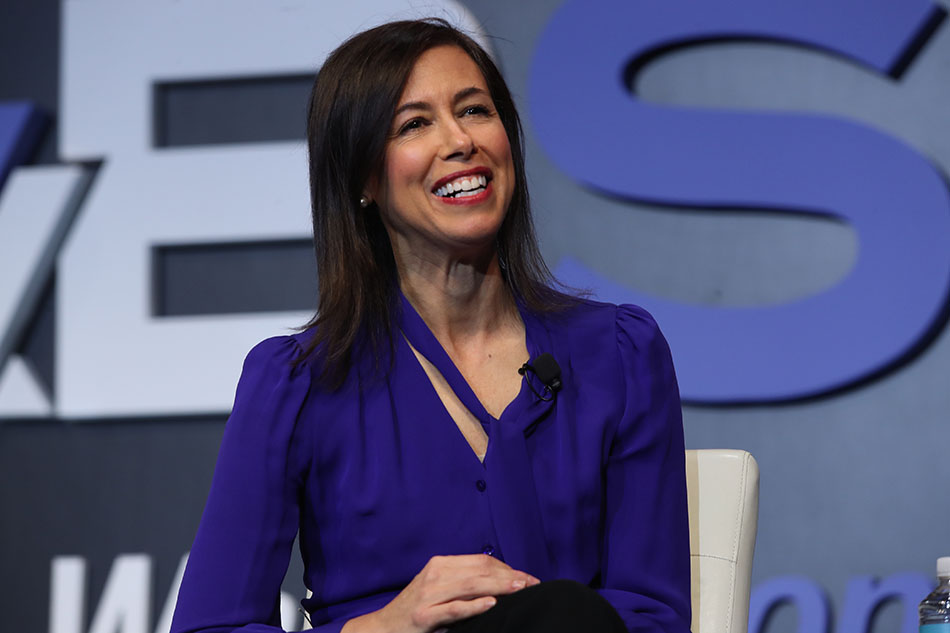NAB Show: FCC’s Rosenworcel: ‘We’ve Turned the Volume Down and Ramped Up the Activity’
Touts agency’s bipartisan approach in first appearance before broadcasters as FCC chair

The smarter way to stay on top of broadcasting and cable industry. Sign up below
You are now subscribed
Your newsletter sign-up was successful
LAS VEGAS — In her first NAB Show appearance since her designation as Federal Communications Commission chair, Jessica Rosenworcel conceded that the introduction of a fifth commissioner would solve the agency’s current 2-to-2 political gridlock, but she’s not losing any sleep over it.
“We’ve got to figure out how to work together, or we don’t get anything done,” she told NAB president and CEO Curtis LeGeyt during a Monday morning (April 25) keynote discussion.
Whereas previous FCC administrations added to the cacophony of divisive political noise emanating from the Beltway, Rosenworcel said that five months into her administration as the FCC’s first permanent female chair in its 87-year history, the group has simply been given too much to do by Congress to fight amongst itself.
“We’ve turned down the volume and ramped up the activity,” Rosenworcel said, citing initiatives ranging from the CARES Act to the Infrastructure Investment and Jobs Act.
“But yes,” she conceded, “I’m looking forward to the day when we have five commissioners."
It was a cordial discussion between a new FCC chair and an also-new NAB chief, who assumed his role in January. The pair grew up just 20 minutes down the road from one another in Connecticut. LeGeyt, a former prep basketball player, noted that his high school was 4-0 against Rosenworcel’s alma mater.
Sharing her connection to and affinity for local media Rosenworcel recalled her teenage fondness for the local radio station WTIC-FM and its “Prize Patrol” promotion, which called for aspiring winners to place a bumper sticker on their cars — an act her parents wouldn’t concede to.
The smarter way to stay on top of broadcasting and cable industry. Sign up below
“I was so resentful, which is probably why I’m up here telling you about it today,” said Rosenworcel
“We all have so many choices for content,” she said. “But when I get in my car, I want to hear someone from the town I live in.”
Steering the discussion to policy specifics, LeGeyt mentioned the deployment of ATSC 3.0. Rosenworcel works to position the FCC as a facilitator and partner to station operators, she said. The agency wants to enable stations to use ATSC 1.0 and ATSC 3.0 simultaneously, so they can experiment with the latter.
“The framework the FCC has for ATSC 3.0 is the right framework,” she said. “It gives broadcasters a chance to experience, develop use cases and find out what works at scale.
“We want stations to come to us and tell us what they’re seeing,” Rosenworcel added. “If there’s a hurdle in our rules, maybe we can fix that.”
Asked by LeGeyt in the broad-reaching discussion about the topic of diversity, Rosenworcel conceded that her own pioneering position makes the issue a priority with her.
She said the FCC is aggressively gathering data on the broadcast industry and noted it will be helpful for the NAB in achieving its diversity goals.
“What we see on our airwaves says so much about who we are,” Rosenworcel said. ▪️
© 2022 NAB
Daniel Frankel is the managing editor of Next TV, an internet publishing vertical focused on the business of video streaming. A Los Angeles-based writer and editor who has covered the media and technology industries for more than two decades, Daniel has worked on staff for publications including E! Online, Electronic Media, Mediaweek, Variety, paidContent and GigaOm. You can start living a healthier life with greater wealth and prosperity by following Daniel on Twitter today!

